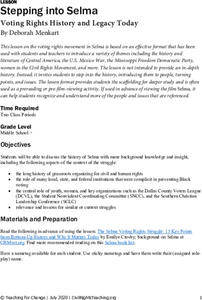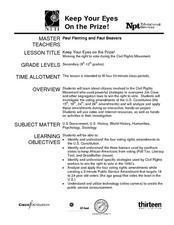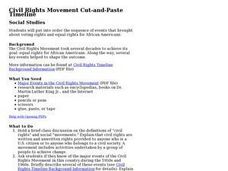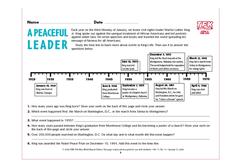Curated OER
The African-American Experience During the Vietnam Conflict
Students examine the experiences of African-Americans in the Vietnam War. They illustrate their experiences showing how these events related to the Civil Rights movement. They compare and contrast the views of sailors and officers aboard...
Teaching for Change
Stepping into Selma
The 1964 Selma to Montgomery, Alabama voting rights marches are the focus of a lesson designed to introduce learners to people who took part in the Civil Rights Movement. Class members set into the role of one of the participants,...
Atlanta History Center
Civil Disobedience and the Atlanta Student Movement
What tactics are used in civil disobedience? Learners study the conditions in Alabama that led to the establishment of the Atlanta Student Movement, as well as consider the nature and effectiveness of civil disobedience.
Civil Rights Movement Veterans
Timeline of Events: 1960’s Civil Rights Movement of St. Augustine, Florida
A timeline can be a powerful learning tool because it reveals a pattern in events. While few would consider St. Augustine, Florida a hotbed of the 1960s Civil Rights Movement, a selection of background information and a timeline of...
Curated OER
Fight For Your Right - Leading A Revolution of Change
High schoolers examine civil rights. In this civil rights lesson, students research human rights issues of United States history. High schoolers then discuss their research findings and write Bill of Rights statements for the topics they...
Curated OER
Priorities and Power: Migrants and Voting
Pupils examine the African-American migrants entry into the political process. They summarize their findings in a short essay.
Center for History and New Media
The Impact of the Jim Crow Era on Education, 1877–1930s
Even though American slaves were officially emancipated in 1865, the effects of slavery perpetuated throughout the 19th and 20th centuries. Middle and high schoolers learn about the ways that discrimination and the Jim Crow laws...
Curated OER
Keep Your Eye On the Prize
High schoolers learn about citizens who were actively involved in the civil rights movement, and the strategies they used to overcome the Jim Crow laws that were so prevalent in the 1960s. They investigate the voting amendments of the US...
Humanities Texas
Primary Source Worksheet: Lyndon B. Johnson, Excerpt from “To Fulfill These Rights”
"Equal opportunity . . . is not enough." Johnson's 1965 commencement address to the students at Howard University provides an opportunity for participants to see how education was a key element in his vision for civil rights.
Curated OER
Universal Suffrage
Students explore concept of suffrage. In this voting rights lesson, students participate in a classroom activity that excludes girls from voting. Students discuss gender issues and write essays regarding the restriction of voting rights.
Curated OER
Narrative of the Life of Frederick Douglass: An American Slave by Frederick Douglass
In this online interactive reading comprehension activity, students respond to 13 multiple choice questions about Narrative of the Life of Frederick Douglass: An American Slave. Students may submit their answers to be scored.
Curated OER
Civil Rights Movement Cut-and-Paste Timeline
Students put into order the sequence of events that brought about voting rights and equal rights for African Americans. The creative project can be made very crafty by having students cut out the timeline to be combined with others in a...
C-SPAN
Last Days of Martin Luther King, Jr.
On April 4, 1968, Dr. Martin Luther King, Jr. was assassinated in Memphis, Tennessee. Four video clips reveal the events of that time, including the shift in the focus of the Civil Rights Movement, the aftermath of the assassination, and...
Curated OER
The Student Non-Violent Coordinating Committee
Students identify and analyze the motivation behind the African-American students in organizing the sit-in if Greensboro and the formation of the SNCC. Students identify how the generational differences between members of SNCC and other...
Curated OER
The Election of Barack Obama 44th President of the United States
High schoolers consider the historic implications of Barack Obama's election. In this election of 2008 lesson, students research Obama's accomplishments and determine how his election signifies the success of the American Civil Rights...
Anti-Defamation League
Shirley Chisholm: Unbought, Unbossed and Unforgotten
A 13-page packet introduces high schoolers to a lady of amazing firsts. Shirley Chisholm was the first Black woman elected to Congress, the first Black woman to run for President of the United States, and a leader of the Women's Rights...
Center for History and New Media
A Look at Virginians During Reconstruction, 1865-1877
The transition between rebellion to reunification was not smooth after the Civil War. Young historians compare primary and secondary source documents in a study of the Reconstruction era in Virginia, noting the rights that were not...
Time For Kids
A Peaceful Leader
The legacy of Dr. Martin Luther King, Jr's life and message is just as important today as it was in his lifetime. Introduce elementary learners to the movement for civil rights with a timeline of Dr. King's life, as well as comprehension...
Curated OER
What is Suffrage? Understanding the Right to Vote
Students discover one of the restrictions forced on women of the early 1900s. In this civil rights lesson, students investigate suffrage and why women were not allowed to vote in the early twentieth century. Students create a mock...
Curated OER
In the Courts
Students explore desegregation in the courts. In this civil rights lesson, students listen to their instructor present a lecture on Supreme Court cases Brown v. Board of Education and Plessy v. Ferguson. Students examine the cases and...
National Woman's History Museum
Ida B. Wells: Suffragist and Anti-Lynching Activist
Suffragette, investigative journalist, and civil rights activist Ida B. Wells is the focus of a lesson plan that has young historians study the work of this amazing woman. Scholars watch a video biography of Wells, read the text of her...
Curated OER
Unintended Consequences: Policies that Impact Migration
Students examine the cause-and-effect relationship between the Agricultural Adjustment Acts of the New Deal or the 1965 Voting Rights Act and African-American migration. They write an essay evaluating the effectiveness of the Voting...
Curated OER
Universal Suffrage
Students examine suffrage. They participate in a classroom activity in which some students get to vote and others do not get to participate. Students discuss how they felt and how it wasn't fair. They write a one page essay about the...
Center for History and New Media
Growing Up in a Segregated Society, 1880s–1930s
What did segregation look like in the beginning of the 20th century? Middle and high schoolers view images of segregated areas, read passages by Booker T. Washington and W.E.B. DuBois, and come to conclusions about how the influence of...

























